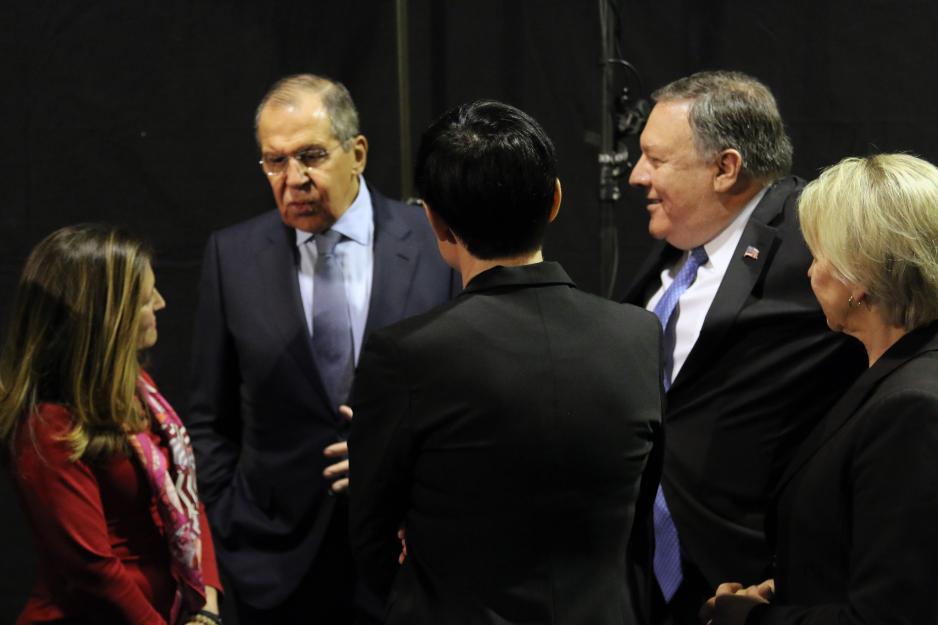Arne O. Holm says The Arctic Council: On the Brink of Collapse or Still a Hope for Cooperation?

Sist samtlige arktiske utenriksministre møtte i Arktis råd var i Rovaniemi i Finland i 2019. Trumps utenriksminister, Mike Pompeo, torpederte møtet. Her sammen med den fortsatt russiske utenriksminister, Sergej Lavrov. (Foto: Arne O. Holm)
Comment: The US threatens to take over Greenland and Canada with military power if necessary. The Nordic countries, Norway, Sweden, and Finland, fear a military attack from Russia. On Monday, they "meet" in Tromsø.
This is an opinion piece written by a member of the editorial staff. All views expressed are the author's own.
Against all odds.
The meeting's framework is the Arctic Council, an organisation comprising eight Arctic countries that insist on its own significance.
The community, which was once celebrated with pomp and splendor at a ministerial level, has been reduced to a digital meeting between ambassadors. It is not even certain whether all countries will show up.
Stopped funding
Ahead of the meeting, Russia has withdrawn its financial support to the council, and is not willing to accept its reduced influence after the cooperation with the other seven countries was put on hold after the invasion of Ukraine.
Conflicts rather than community characterize international organisations, which are tied together by geographic rather than ideological cooperation.
A masterclass in diplomacy prevented collapse.
The meeting in Tromsø marks the transition from Norwegian to Danish/Greenlandic leadership - a transfer made possible because Norway has prevented a complete collapse, holding a masterclass in diplomacy.
And two questions arise: Does the Arctic Council have any value in itself? And is there even a common foundation for continued cooperation?
The answer to the latter is complicated.
The conflict with Russia is well-known. It is about a member country that is sanctioned and banned politically and institutionally, but still participates in the working groups.
Fears war
In other words, Russia as a nation is not excluded. This is important because the Arctic Council is more about research cooperation than political cooperation in the current situation.
Lighting a fuse under the Arctic cooperation.
Then add that PM Jonas Gahr Støre, only days before the council "gathers", told his own population to be prepared for war. This happened in connection with the presentation of Norway's new security strategy, and the war threat comes from Russia.
During the two years Norway has led the Arctic Council work, a new enemy of international cooperation has appeared. Donald Trump.
He has also used the past few days to light a fuse under that cooperation.
The other day, he reiterated the message of considering using military power to take Greenland from Denmark. When Denmark takes the chairship, it also takes the chairship over a nation that directly threatens its national borders.
Threatens own members
However, Trump is not content with threatening just one of the member countries. Canada was also told a few days ago that the country should cease to be an independent nation and be incorporated as a US state.
Trump's absurd megalomania.
The ambitions, if I can use such a mild expression about Trump's absurd megalomania, are strongly condemned by both Canada and Denmark.
However, Trump's obstacles to Arctic cooperation extend further than that. Under the Danish chairship, two policy areas in particular are highlighted: climate and indigenous peoples. This is emphasized precisely by Greenland's special position in the Danish leadership.
One would have serious problems rubbing sleep out of one's eyes to not have discovered that these are two topics that Trump is intensely opposed to, in addition to a general opposition to international organizations.
Therefore, the chance that the Arctic Council will collapse in the next two years is imminent.
Pointless collapse
But if that doesn't happen, I will answer the first question. Given all the contradictions, does the Arctic Council still have any value?
Squeezed between American fascism and Russian dictatorship.
The simple answer is yes.
And perhaps that is precisely because of the severe built-in conflicts. Yes, because every international cooperation, any dialogue, has value in a world in turmoil. In such a situation, every open door is an opportunity to avoid a meaningless and catastrophic collapse of humanism and the economy.
So perhaps the democratic states of Canada, Sweden, Denmark, Finland, and Iceland will manage to find common ground, even when squeezed between American fascism and Russian dictatorship.
Perhaps Russia and the USA could even see the inherent value in a sort of cooperation between Arctic neighbors.
On Monday next week, after the digital meeting, we might know more.
Although the meeting is closed to the press, we will know if Russia has participated in or boycotted the meeting. And we know more about the US position, even though US positions have largely had shorter shelf lives than a carton of cream.
We of High North News will be present, both in the corridors and at the subsequent press conference.


